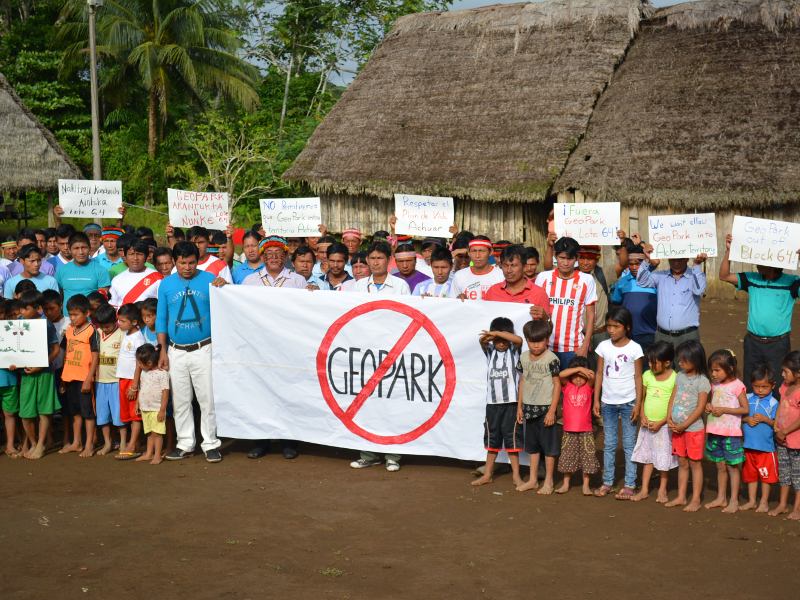By any measure, 2020 has been a dramatically unprecedented year, forcing us all to adapt to new challenges while facing the grim realities of racial injustice, the violence of right-wing political leadership, and the acceleration of the climate crisis. In these extraordinary times, RAN’s Community Action Grants (CAG) program has remained dynamic and responsive to the evolving needs of the times to stand in solidarity and provide direct support to Black, Indigenous, and People of Color communities across the globe disproportionately impacted by the compounding effects of a deadly pandemic, corporate resource plundering, state-sanctioned violence, and increasingly destructive and frequent natural disasters.
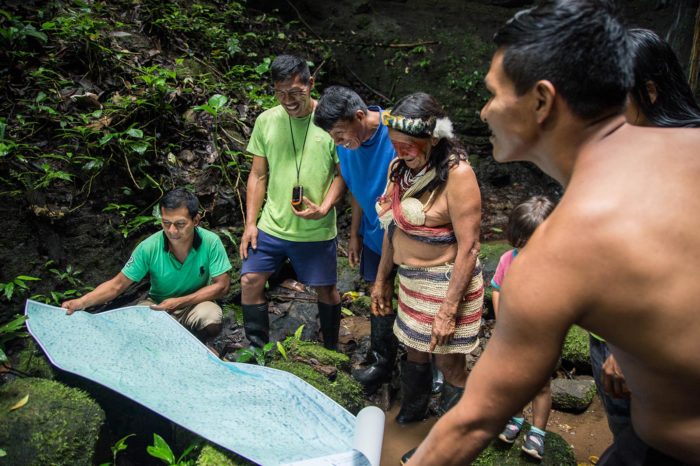
For Rainforest Action Network, standing in solidarity with our partners and allies on the frontlines has meant responding to urgent needs outside of our typical grantmaking priorities. Reflecting on the evolution of the CAG program this year, we are proud to share that our grantees’ needs came first and we responded, taking their lead. We increased the dollar amounts for small grants, provided critical mutual aid, and released rapid funds for another year of record-breaking arson fires across the globe. The following reportback describes four of the most critical priorities that surfaced for our grantees this past year: rapid response, grassroots mobilization, defending rights, and remote resistance.
Rapid Response: Meeting the unexpected moments from COVID-19, civil rights uprisings, and increased state violence.
To support emergency COVID-19 responses by Indigenous communities and organizations to prevent the spread of the pandemic in the Amazon Basin, RAN supported funds to provide rapid response grants for urgent and immediate prevention and care; food and medical supplies; emergency communications and evacuation; protection and security for Forest Guardians in the Amazon; and food sovereignty and community resilience. In North America, we leveraged our networks to execute peer-to-peer fundraising efforts to support the Navajo Nation and Hopi reservation. RAN also stood in solidarity with the Movement for Black Lives (M4BL), following the murder of George Floyd and the subsequent uprisings against police violence across the country. Challenging systemic injustice is a priority for us here at RAN, and that is one reason why we support Black-led local partner organizations advancing the vision of building a better future for Black communities in the U.S. to move our country — and the collective work of our movements — forward.
Grassroots Mobilization: Funding mobilizations, activist convergences, and strategy sessions.
In July 2020, the Achuar and Wampis nations of the Peruvian Amazon notched another win in their struggle to defend 5 million acres of ancestral territory, with the announcement of the irrevocable departure of GeoPark from oil lease Block 64. This victory is a result of over a year of organizing and powerful mobilizations, including the notable delegation of Achuar and Wampis Indigenous leaders that pressured the oil company GeoPark at its annual shareholders meeting in Santiago, Chile, to cancel their planned oil extraction project on Indigenous territory in the Peruvian Amazon. This delegation also met with Peruvian government officials in Lima prior to going to Chile. In the case of the Achuar, this is the 4th international oil company they have successfully stopped from developing major oil extraction projects on their territory since 1995. RAN has been supporting the Achuar with small grants over this time period for a variety of activities from community organizing workshops, to legal challenges, to delegations and mobilizations – we have done these grants in partnership with Amazon Watch, which has been a partner to the Achuar for over 20 years.
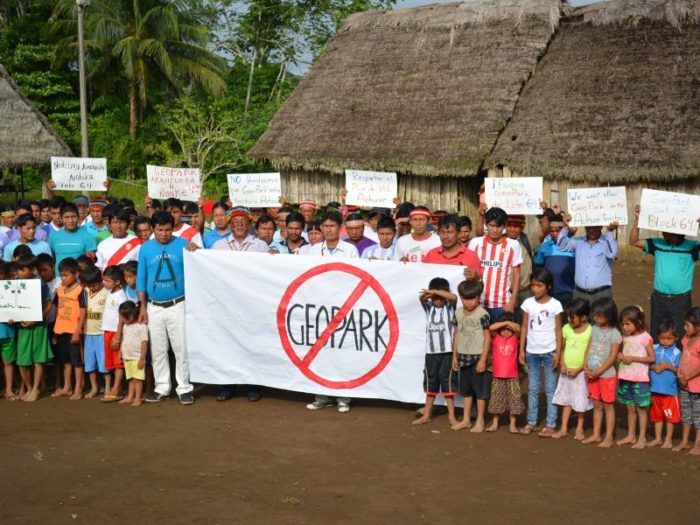
In the Ecuadorian Amazon, RAN also supported grassroots mobilizations to continue building momentum for the Waorani peoples, after setting a historic legal precedent to protect 7 million acres of neighboring Indigenous territories, accomplished in July 2019. RAN has provided resources to the predominantly women-led Waorani leadership team to strengthen the governance and administration of the regional organization and equip an all-women technical support team consisting of a strategic advisor, human rights attorney, technical assistant and accountant to support the Waorani leadership team. RAN has also supported grassroots efforts of CONCONAWEP and the Kofán of Sinangoe as they mobilize to prepare for upcoming proceedings before the Constitutional Court, to advance and strengthen Indigenous rights to Free, Prior, and Informed Consent (FPIC) in the Ecuadorian Constitution.
Defending rights: This past year has necessitated a strong defense of Indigenous rights, and RAN has played a part in supporting the critical processes of legal ancestral land titling.
After comprehensive trainings and robust territorial mapping plans supported by RAN, the Siekopai of the Peruvian Amazon secured two land titles in late September. This was accomplished through supporting community leaders’ presence in Ministry meetings, and also the acquisition of a legal assistant in Iquitos, Peru to give daily follow up and accompaniment with Indigenous leaders. Prior to this milestone there were several trainings, and one trip into ancestral lands, to initiate the large-scale territorial mapping process with the Siekopai that will serve as a powerful tool in their ongoing legal claim seeking to increase Indigenous autonomy over their rainforest territories in Peru. The Siekopai are also developing a robust community plan to map the rest of the 300,000-acre territory over the following year with Siekopai community members in Lago Agrio, Ecuador.
In North America, we supported the Wet’suwet’en fight to protect their territory and the Unist’ot’en Village Camp from several proposed oil and gas pipelines. The pipelines that have been proposed to cross Wet’suwet’en territory are required to enable expansion of shale gas fracking operations on Dene territory (NE British Columbia) and could also be converted to transport bitumen from the tar sands mine in Cree territory. In January 2019, and again in January 2020, the Unist’ot’en village was raided by heavily armed police forces and many of its occupants were arrested. To continue defending their territory, the Wet’suwet’en needed to engage in legal battles to defend themselves against criminal charges and also maintain the Healing Centre and village that now exists on the proposed pipeline route(s).
RAN provided direct support to help maintain general operations of the Unist’ot’en Camp and the Healing Centre, and to conduct public awareness-raising activities about their initiative. Unist’ot’en Camp and the Healing Lodge and operations fortify the ongoing defense of Indigenous sovereignty on Wet’suwet’en land. The Unist’ot’en continue to assert the jurisdiction of their hereditary leaders by occupying their traditional territory and by defending their actions in the Canadian court system. By doing so, the camp continued to inspire the Wet’suwet’en and other First Nations across North America to revitalize their cultures and to function as protectors of their territories.
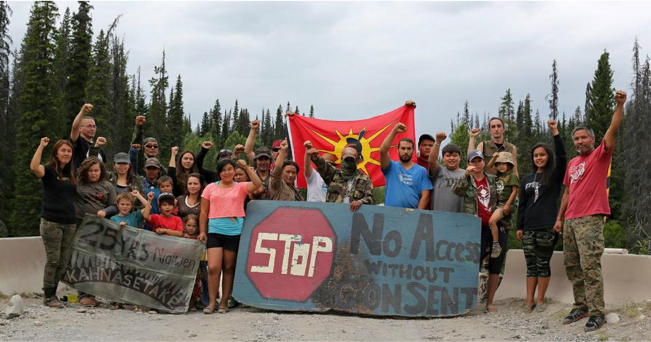
Remote Resistance: Supporting digital Indigenous-led initiatives to bring awareness to rights violations in addition to on-the-ground impact of corporate extractivism.
While much resistance to fossil fuel projects happens in person on the ground, the Carrizo and Comecrudo Tribe of Texas sustained pressure by organizing remotely to resist the three fracked gas export terminals proposed in the Rio Grande Valley in South Texas. In May 2020, more than 400 participants on Zoom and more than 7,000 listeners over Facebook joined the Carrizo Comecrudo Tribe of Texas in partnership with the Gulf South for Green New Deal Initiative to participate in the Carrizo Comecrudo Tribunal for Human Rights, partially funded by RAN. This Tribunal brought national and global awareness to the violations happening at the U.S. southern border and acted as a call to action to stop the petrochemical buildout in the Gulf South, which is impacting Carrizo Comecrudo sacred lands and native habitats that are distinct and extremely endangered.
While many parts of the globe have been on lockdown, Indigenous media producers have used the time to document and share media from their own vantage points. RAN supported the Amazon Frontlines communications team to work with two Indigenous Siekopai storytellers to produce a 23-minute documentary about their journey to Bolivia, where ongoing fires were ravaging the natural environment and threatening the lives and livelihoods of Indigenous communities. The documentary will be released and distributed across Amazon Frontlines and partner organization’s digital channels. Indigenous-led media efforts are critical to ensure that Indigenous voices and stories are amplified. Furthermore, the products for the Indigenous-led media efforts are being frequently leveraged in digital rallies, remote organizing, webinars, and wide reaching online platforms. Developing media capacity of Indigenous communities is key to promoting awareness of the lived impacts of issues like the Amazon fires digitally.
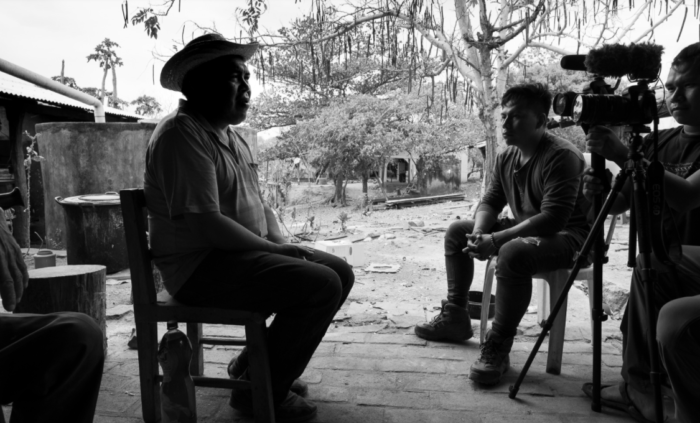
As this year closes, we uplift the resistance and resilience of our CAG grantees and long-term partners on the frontlines of extraction and state-sanctioned violence. We acknowledge how much work there is left to do and we reiterate our commitment to taking their lead in collective resistance. While the conclusion of this year offers a semblance of resolution, we here at RAN are prepared to continue being adaptive to whatever the future brings in 2021.
